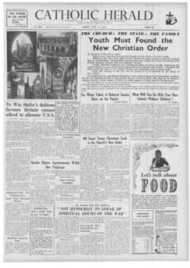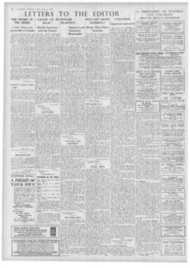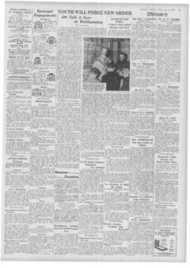Page 5, 13th June 1941
Page 5

Report an error
Noticed an error on this page?If you've noticed an error in this article please click here to report it.
Tags
Share
Related articles
Jubilee Of Rerum Novarum
Workers, Employers
Papal Mass For
Rerum Novarum 9 Rally In London The Westminster Diocesan...
Dorothy Sayers:
LONDON CELEBRATES SOCIAL ENCYCLICAL
Less Talk and More Application of Principles of " Rerum Novarum"
urges Trade Unionist
Cardinal Hinsley presided over a crowded meeting of the Catholic Social Guild, celebrating the Golden Jubilee of Rerum Novarum in the Cathedral Hall, Westminster, on Sunday afternoon. The Cardinal was supported by Bishop Myers, and there was a large and distinguished " platform," which included English, Dutch and Belgian politicians, among these being M. Gerbrandy (Prime Minister of Holland), M. Techoffen (Belgian Minister of Commerce), M. de VIeeschattwer (Minister of Belgian Colonies), M. W. Koelman (Member of Belgian Parliament), M. L. Laurent (Director of Bureau Belgian Refugees).
The meeting was organised by some 18 Catholic societies active in social work, and was chiefly remarkable for an outburst from Mr. Bernard Sullivan (Indian District Secretary of the National Union of Tailors and Garment Workers, and Chairman of the Social Welfare Committee of the L.C.C.), calling for an appreciation of the principles of Rerum Novarutn and less talk about them.
Mr. Bernard Sullivan, in rapid, breezy and dynamic Yorkshire, said: " It is high time the principles set forth iI Rerum Novarum were put into practice instead of being preached and discussed. When this Encyclical was first issued it was kept away from the people, and it was only during the last 25 years that we in England have had our attention drawn to it.
" On the continent great writers and preachers took it up, but during one of the darkest periods of our history—a period of industrial slavery, mass unemployment and other social abuses—when the principles laid down in this great Encyclical were most needed, we were told. We don't want politics here.' "
Applause greeted his statement.
" But I say we do want politics—not party politics. We don't want to make the mistake of setting up Catholic trade unions as they did on the continent, or to make these social questions Catholic ones—we want to make them universal.
WE MUST MAKE OURSELVES FELT
" We hear a great deal of talk about what is going to happen after the war—and that Hitler is going to make a Herrenvolk. We must be careful in this country that we don't create a Herrenclass. We must get away from the idea that the same body of people shall always be in possession.
" We must get away from the idea of
having nothing to do with polities. We Catholics should get into all these organisations—Labour, Liberal or Conservative, and there push forward the ideas of the Popes, The Church would be much more respected if it were to go into these movements and into the trade unions, too, taking our place among the trade union officials.
"There are 50,000 women workers in my own industry. But how many of them are in the trade union? How many are apostles of zeal. There are more Catholic women workers in factories than there are communists in the whole of the world."
WORKERS' DUTY
Mr. Sullivan appealed strongly for a united body of Catholics in every town who would have their own representatives on the various social and industrial councils and committees. " What is the use of discussing these principles laid down in Rerum Novarum if we don't apply them?" he asked.
" It is the workers' duty to inspire the employers to put the principles into operation. And unless we go away with that idea of getting something definite done, it will eg a just s:,t a case of waiting for the next annual meeting to talk about Rerum Novarum The Cardinal, opening the meeting, said: " In these sad times we are celebrating as best we can the fiftieth anniversary of Leo XIII's Rerun. Novarum as well as Pius XII'S Quadragesimo Anna.
" As I look round you seem to me all very young, and I am sure you don't remember conditions as they were before Rerum Novarum. Rut I am an old fossil, dug up three-quarters of a century ago somewhere in England, and I claim the privilege of an old man indulging in reminiscences.
NOT A BOLT FROM THE BLUE
" In the eighties of last century the modern movements of Catholic Action were just beginning. You must not suppose that Rerun, Novarum was a bolt from the blue. The great Cardinal Manning, in speeches and in articles, proved himself to be the champion of the working man. The famous Cardinal's Peace brought about the ending of the great Dock Strike of 1889. He was a pioneer in the solution of social problems, and on the continent thee were other men working in the same direction in conjunction with Leo XIII, " One day, it was May 15, 1891, 1 shall not easily forget. I was a student at the Gregorian University in Rome, and in the same lecture hall was Mgr. Merry del Val — he afterwards became Cardinal Secretary of State. We had been in school together in the North of England. He had told me about this new Encyclical that the Pope had written, and on that day he brought me one of the very first copies issued from the Vatican—before it had been sent to any of the public.
" And now I am going to make a confession—for two hours 1 sat under the lecturer's nose and read the Encyclical with all the ardour of youth."
Even at its first introduction to the public, the Cardinal went on, the general acceptance was distinctly favourable. The Times declared that it was written with all the knowledge of a statesman and which, if wisely accepted, would go far towards solving many of the industrial problems of the day.
" RERUM NOVARUM " IN HOLLAND How Rerum Novarum was received in Holland was explained by Professor Veraart, Rector of Delft University, and now attached to the Ministry of Justice of Holland.
" The words of the great Leo Mil were a revelation to the Netherland Catholics. They had taken only a slight part in the wonderful work of the Radicals, from 1886 onwards, and they were timid of the ideas of Doctor Abraham Kuyper.
" It was left to a poor curate, Father Wijnen, at Maastricht—one of the centres of the horrible industrial abuses against women and children known as a children's cemetery—to fight bravely for the principles of Rerum Novarton. To the dishonour of our Dutch Catholics, it must be said that persecution was his lot, and even to this day a monument to his honour is forbidden."
Two great men also fought in this cause. Doctor Schaepman and Doctor Ariens—the former a great leader, the latter a saintly priest, whose parish was in an industrial area. Dr. Schaepman had ten years of bitter struggle, fighting in Parliament and at meetings. Not only had he to fight the narrow-minded newspapers, but he was also up against the complacency a the industrialists, the middle classes and the peasants. These all believed themselves to be excellent Catholics—and so they were in many respects,. living soberly, fighting for Catholic schools, full of charity, but with no understanding for the rights of the workers, or for fair wages and reasonable working hours.
WORKMEN'S NEEDS
They took care of the poor to a certain extent, but it did not dawn on them that workmen should never belong to the poor; that workmen should have their own homes, their living wages, their holidays—that they want to take care of themselves, as other classes did.
Dr. Ariens helped Dr. Schaemnan in his struggle. He did for the textile industry what Cardinal Manning did for the dockers in England. Slowly these two men formed a school of fighters. Well-disciplined minds all over the country gave their knowledge and their labour, and in 1900 victory was virtually attained. When Shaepman died in 1903 he left a good, willing people, a people thinking in the style of Rerum Novarum, a Parliamentary gioup ready to achieve victory.
Mr. Paul Kelly, representing the employers, gave a short account of the conferences that are held bi-annually at Campion Hall, and Mr. M. P. Deroy, secretary of the Christian Syndicate of State Employed of Belgium, paid tribute in English. French and Flemish to the principles embodied in the two Encyclicals. Miss Barbara Ward, secretary of the Sword of the Spirit, also spoke.
blog comments powered by Disqus









